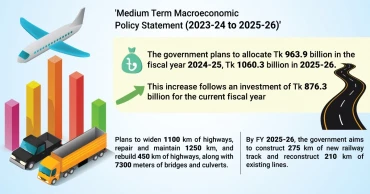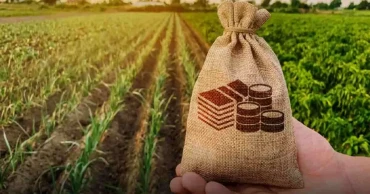Medium Term Macroeconomic Policy
Govt plans Tk 2000 billion investment in transport and communication for next two fiscals
The government plans to substantially increase public investments across key sectors such as road, rail, bridge, shipping, civil aviation, and telecommunications. These initiatives are strategically aimed at transforming Bangladesh into an upper middle-income country by 2031 and a smart developed country by 2041.
According to the 'Medium Term Macroeconomic Policy Statement (2023-24 to 2025-26)', the government plans to allocate Tk 963.9 billion in the fiscal year 2024-25, escalating to Tk 1060.3 billion in 2025-26. This increase follows an investment of Tk 876.3 billion for the current fiscal year, emphasising a significant boost in funding for various development programs.
The policy document highlights the critical role of an integrated and cost-effective transport and communication system in fostering economic growth, enhancing trade, and ensuring social integration. It states that an efficient transport and logistics system is essential for smooth supply chain management and to effectively compete on a global scale.
Transport strike called off after 12 hrs in Ctg
Specifically, the Road Transport and Highways Division is implementing projects to establish an advanced and sustainable road transport system, including the construction of multi-lane highways, elevated expressways, and new bridges.
These efforts are complemented by plans to widen 1100 km of highways, repair and maintain 1250 km, and rebuild 450 km of highways, along with 7300 meters of bridges and culverts.
In Dhaka city, the government is focusing on reducing traffic congestion by advancing the metro rail lines, a move poised to significantly improve urban mobility.
The railway sector is also undergoing transformation under a 30-year master plan aimed at making it a dependable, affordable, modern, and people-friendly mode of transport. Initiatives include connecting every district with a railway network, upgrading tracks, and modernising the signaling system. By FY 2025-26, the government aims to construct 275 km of new railway track and reconstruct 210 km of existing lines.
The document also outlines ambitious plans for the water transport system, noting its importance in the integrated multi-modal transport framework. The Ministry of Shipping is executing extensive programs for the enhancement of inland waterways, seaports, and land ports, along with significant dredging efforts to maintain river navigability.
Extortion in transport sector will never stop completely: Quader
Amidst rising demand for air travel, both domestically and internationally, the Ministry of Civil Aviation and Tourism is undertaking projects to expand passenger handling capacities and enhance facilities at airports. These upgrades are part of a broader strategy to position Bangladesh as a regional hub for international passenger transport.
These comprehensive plans not only aim to modernize Bangladesh's infrastructure but also serve as a cornerstone for the country's ambitious economic development goals.
1 year ago
Bangladesh earmarks Tk 385 billion for agriculture, aiming for 10% annual growth by fiscal 2026
The Bangladesh government has earmarked Tk 385 billion for agricultural development over the next three years, targeting an average annual growth of 10% in the sector by the 2025-26 fiscal year.
This investment underscores agriculture's pivotal role in achieving food security and driving equitable economic growth, according to the 'Medium Term Macroeconomic Policy Statement (2023-24 to 2025-26)'.
Despite a diminishing share in GDP, agriculture remains critical for the livelihood of the majority, particularly in rural areas. To boost food production and resilience against adversities, the government's strategy includes developing high-yield and adversity-tolerant crop varieties, expanding mechanization and irrigation, and improving access to affordable inputs like seeds and fertilizers.
No respite from heat wave in five days: BMD
The policy document highlights several initiatives aimed at modernizing agriculture through technology. These include increasing the use of surface water for irrigation over groundwater to conserve resources, incorporating renewable energy solutions, and employing remote sensing for crop monitoring.
The government also continues to support the sector with subsidies, financial incentives, and technological innovations to foster a sustainable and self-reliant agricultural framework.
Significant contributions also come from the fisheries and livestock sub-sectors, which not only bolster GDP—2.53% and 1.91%, respectively—but also provide essential protein sources and livelihoods for over 12% of the population. Achievements in these areas include self-sufficiency in fish, meat, and egg production, with milk expected to follow. Moreover, these sectors are vital for foreign exchange earnings through exports.
Looking ahead, the Ministry of Livestock and Fisheries is set to launch development projects to enhance production capacities, adopt advanced management technologies, and improve conservation efforts, particularly for young hilsa fish ('jatka').
Water resource management is another focal area, given its importance to sustainable agriculture. Initiatives are underway to improve surface water availability through the excavation of water bodies and the enhancement of coastal afforestation, aiming to secure equitable water shares from transboundary rivers.
NAP Expo 2024: Bangladesh to showcase climate adaptation success, Environment Minister says
Amid threats of substantial economic losses due to climate change—projected at a 6.8% reduction in GDP by 2030—the government has prioritized comprehensive strategies to mitigate these impacts. The Mujib Climate Prosperity Plan is designed to equip vulnerable sectors and communities with the tools to enhance resilience and stability against climate-related disruptions.
Through these multifaceted efforts, Bangladesh is taking decisive steps to not only safeguard but also advance its agricultural heritage in the face of evolving global challenges.
1 year ago



